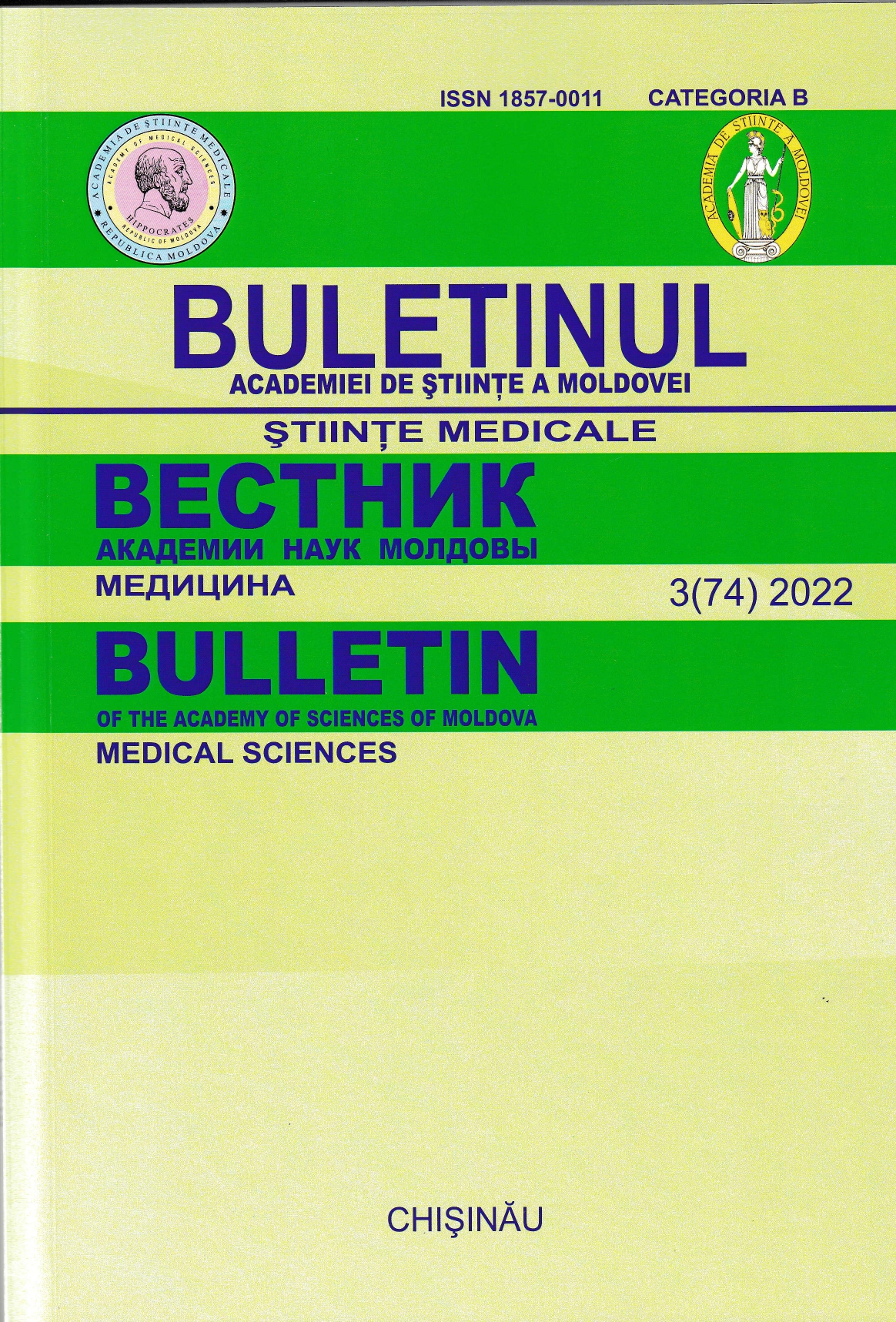Knowledge, attitudes and practices of mental health professionals regarding the management of major cognitive disorders in the Republic of Moldova.
DOI:
https://doi.org/10.52692/1857-0011.2022.3-74.11Keywords:
CAP study, cognitive impairment, dementia, managementAbstract
Major cognitive impairment is a significant public health problem despite advances in patient management.The purpose of the research was to analyze the knowledge, attitudes, and practices of mental health specialists regarding the management of major cognitive disorders in the Republic of Moldova. Material and method: The research were descriptive online survey type. A structured questionnaire with self-completion questions was used. The questionnaires were pre-tested and validated prior to conducting the research. Results: Barriers identified: 50.0% lack of social support services, 34.4% lack of a national guide/program, 46.9% lack of interdisciplinary collaboration, 43.8% problems in communicating with the patient, 25, 0% difficulties in establishing the diagnosis and developing the treatment plan, 31.3% in communication with relatives/caregiver, and 40.6%
in the diagnosis and treatment of concomitant diseases. During consultations, 75.0% of those interviewed quantify the degree of impairment of cognitive function, 71.9% know national and international guidelines/protocols, 90.6% consider training in social and cultural activities useful, 75.0% – performing exercises physical therapy, 65.6% physical therapy, 56.3% cognitive-behavioral therapy, 53.1% speech therapy sessions, 46.9% psychotherapy, and 28.1% state that all options are useful. Positive attitudes 96.9% believe that the patient with cognitive disorders must benefit from access
to medical services according to individual needs and that the patient has the right to live with dignity, without suffering, 81.3% are of the opinion that patients must be included in social and cultural activities, 62.5% support that people with cognitive disorders should benefit from institutionalization for palliative care. Negative attitudes 50.0% believe that patients consume time, emotions, and resources, and 25.0% mention that they are a burden on the healthcare system.
Conclusion: The most frequent difficulties in the approach and management of patients with cognitive disorders are cited as the lack of social support services for patients or families, interdisciplinary collaboration/difficulty referring to other specialists and a national guide/program for cognitive disorders.
References
World Health Organization (2017) Global action plan on the public health response to dementia 2017-2025.
Prince M, Albanese E, Guerchet M, Prina M. World Alzheimer Report 2014. Dementia and Risk Reduction: An analysis of protective and modifiable factors. London: Alzheimer Disease International; 2014.
Baumgart M, Snyder HM, Carrillo MC, Fazio S, Kim H, Johns H. Summary of the evidence on modifiable risk factors for cognitive decline and dementia: A population-based perspective. Alzheimers Dement. 2015;11(6):718–726.
Xu W, Tan L, Wang HF, Jiang T, Tan MS, Tan L, Zhao QF, Li JQ, Wang J, Yu JT. Meta-analysis of modifiable risk factors for Alzheimer’s disease. J Neurol Neurosurg Psychiatry. 2015.
Russ TC, Ritchie K, Ritchie CW. Prevention of Alzheimer’s Disease and Alzheimer’s Dementia. In: Ames D, Burns A, O’Brien JT, editors. Dementia. 5th ed. London: Taylor & Francis; In press.
Brookmeyer R, Gray S, Kawas C. Projections of Alzheimer’s disease in the United States and the public health impact of delaying disease onset. Am J Public Health. 1998;88(9):1337–1342.
Brookmeyer R, Johnson E, Ziegler-Graham K, Arrighi HM. Forecasting the global burden of Alzheimer’s disease. Alzheimers Dement. 2007;3(3):186–191.
Ritchie CW, Molinuevo JL, Truyen L, Satlin A, Van der Geyten S, Lovestone S. Development of interventions for the secondary prevention of Alzheimer’s dementia: the European Prevention of Alzheimer’s Dementia (EPAD) project. Lancet Psychiatry. 2016;3(2):179–186.
Barnes DE, Yaffe K. The projected effect of risk factor reduction on Alzheimer’s disease prevalence. Lancet Neurol. 2011;10(9):819–828.
Norton S, Matthews FE, Barnes DE, Yaffe K, Brayne C. Potential for primary prevention of Alzheimer’s disease: an analysis of population-based data. Lancet Neurol. 2014;13(8):788–794.
Livingston G, Huntley J, Sommerlad A, Ames D, Ballard C, Banerjee S, Brayne C, Burns A, Cohen-Mansfield J, Cooper C (2020) Dementia prevention, intervention, and care: 2020 report of the Lancet Commission. Lancet 396, 413–446.
Rolandi E, Zaccaria D, Vaccaro R, Abbondanza S, Pettinato L, Davin A, Guaita A (2020) Estimating the potential for dementia prevention through modifiable risk factors elimination in the real-world setting: A population-based study. Alzheimers Res Ther 12, 94.
Barnes DE, Yaffe K (2011) The projected effect of risk factor reduction on Alzheimer’s disease prevalence. Lancet Neurol 10, 819–828.
Downloads
Published
License
Copyright (c) 2022 Bulletin of the Academy of Sciences of Moldova. Medical Sciences

This work is licensed under a Creative Commons Attribution 4.0 International License.



